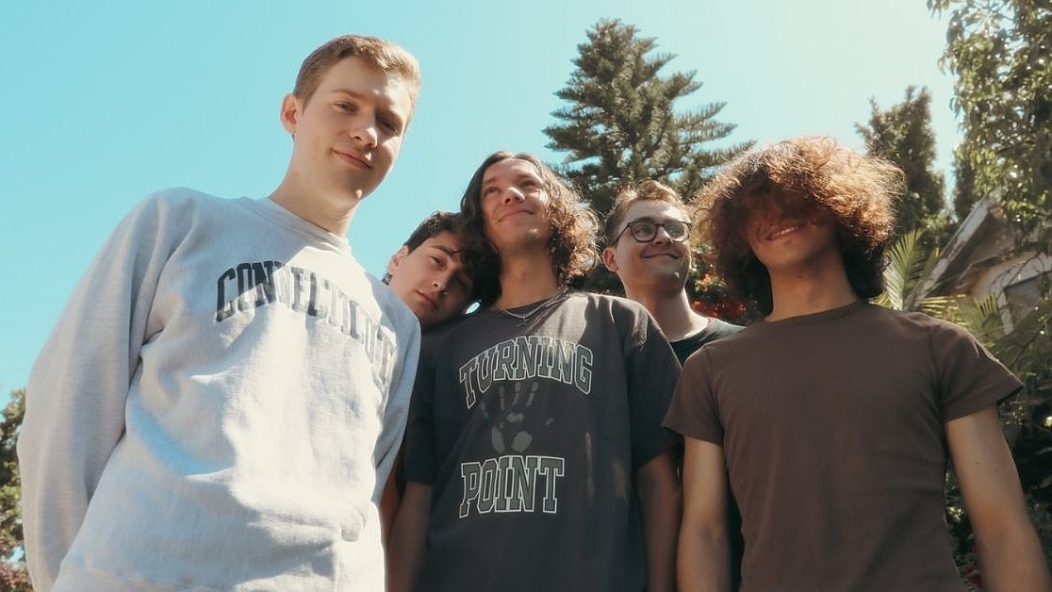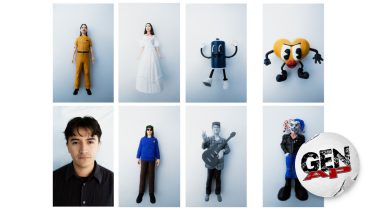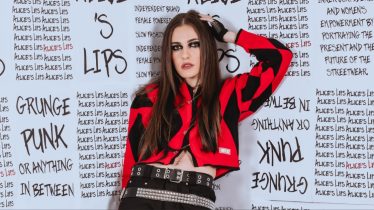
How hardcore band Anxious made a coming-of-age record that fuses doo-wop and pop
When Alternative Press connects with Anxious vocalist Grady Allen and co-vocalist/guitarist Dante Melucci at the Los Angeles vegan fast-food restaurant Burgerlords, it’s prevalent that the band are riding a high. The Connecticut-based group are just months removed from releasing their critically acclaimed debut album, Little Green House, on boutique indie label Run For Cover Records and have scored high-profile tours alongside scene staples such as Knuckle Puck, Thrice and Boston Manor, the latter of which they are currently on tour with.
Read more: See just how cruel Cupid can get in Paris Texas’ new “cyanide” video
These achievements are well deserved as the group penned an accessible and timeless record of classic emo and pop-punk-tinged melodic hardcore that explores their influences and pop sensibilities in the truest form. While the record is a considerable shift from their classic Northeast straight-edge hardcore sound, the band manage to retain their core ethos and values without missing a beat. Anxious, whose members are all in their early 20s, are proving that they are wise beyond their years, and one can only imagine the journey that’s in store for them.
Since the release of your debut album, Little Green House, it seems like the reception has been overwhelmingly positive. Why do you think the album is resonating with people so much?
GRADY ALLEN: It’s very surreal. People liked our last EP Never Better and thought it was cool, but I never saw Anxious as a band that resonates with people. I think it’s resonating with people now because the band stepped up in every possible way, and a lot of that can be attributed to having two years of sitting with the pause button on. We were able to work on the record, the dynamic of the band and the songwriting.
DANTE MELUCCI: I think when we were writing the songs, we were trying to make melodies that weren’t tied down to a certain genre or scene. I was looking to a lot of my pop influences from being a kid, so I pulled that pop sensibility in to make something all-encompassing and accessible.
Little Green House feels like a journey through so many different places, both sonically and lyrically. What went into the writing process specifically?
ALLEN: Going through themes and stylistic shifts, all of that was very conscious. However, cohesion was key and something we were thinking about incredibly hard. We had never recorded a body of material that large before, so when we were working on the songs, we wanted to really focus on placement, dynamics and contrast.
MELUCCI: It always makes me proud when people say that they like the overall flow of the record. Going back to early pop influences, I was thinking about the B-side of the Beatles’ Abbey Road and how the songs transition so well.
Speaking of the album’s sequence, “Wayne” sticks out to me, as it’s a perfect break from the intensity and finds the band in a stripped-down place. Plus, the background vocals are left field in the best way.
ALLEN: That song came together super last minute. We had studio time scheduled about two weeks away, and we were sending songs back and forth to our friend Pat [Flynn], who sings in the bands Fiddlehead and Have Heart. He told us that the record needed a break and a palate cleanser to transition into side B. From there, Dante came in with the whole song and chord progressions. For the backing vocals, and when we got the mixes back, Dante was like, “The bump bumps aren’t percussive enough, and are falling flat.”
MELUCCI: I was thinking “Mr. Sandman” and ’50s doo-wop for the background vocals. [Laughs.]
Beyond the music, you have developed a curated aesthetic, down to the album artwork and music videos. How important are aesthetics to the greater picture of the band?
ALLEN: It’s super important to us. The energy we were trying to create was something playful and fun, with childlike energy. The record is rooted in coming of age and reflective stuff, and I think we wanted the aesthetics to play into those things.
MELUCCI: Naming the record was such a nightmare for so long because we knew it had to have a name that isn’t directly referencing anything on it but captures the overall sonic aesthetic of the record. I almost like to think of the record as a movie or musical called Little Green House where all the stories live within.
Something that’s so charming about the band is the effective use of two vocalists, which creates a distinct sound. What is the delegation process like between the two of you for vocal parts?
MELUCCI: It was brutal this time around.
ALLEN: I think in one or two instances, it was brutal, but it wasn’t that bad. [Laughs.] Dante did a large share of songwriting on this record, and naturally, I think there is a lot of ownership and possession that comes with that. There were some things that felt immensely personal, so there was always the conversation of what makes sense for one of us to sing and what’s appropriate in terms of the delegation.
MELUCCI: That also added to the fun of developing the songs.
Connecticut has always had a rich history in punk and hardcore music, but it feels like Anxious are really putting the state back on the map for this scene for the first time in a while.
ALLEN: Connecticut means a ton to me. It has a tendency to be overlooked because the Northeast has so many legendary scenes in close proximity to each other. However, the reality is that in the late ’80s, it was the genesis of straight-edge hardcore. Outside of Anxious, the scene is definitely on an upward tick with a lot of great bands. I’m immensely proud to be from Connecticut.
This story appeared in issue #407, available below.










